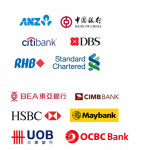By clinching the green loan, Pan Pacific Orchard aims to be redeveloped into a lush green 347-room hotel
- First biophilic and zero-waste hotel in Singapore to secure green loan
- Transforms Orchard Road skyline with its distinctive design and three curated sky terraces
- Pan Pacific Orchard awarded BCA Green Mark Platinum

UOL Group Limited (UOL) announced on 29 July that it has secured a $120 million three-year term green loan from United Overseas Bank Limited (UOB) to redevelop Pan Pacific Orchard into a lush green 347-room hotel.
Table of Contents
In January 2020, Pan Pacific Orchard was awarded the Building and Construction Authority’s Green Mark Platinum, which is Singapore’s highest environmental certification recognising projects whose design and performance adhere to best practices in environmental sustainability.
UOL Group Chief Executive Liam Wee Sin said: “The inaugural green loan demonstrates our commitment in greening our urban habitat. Pan Pacific Orchard will contribute to our government’s vision to transform Orchard Road into a green oasis in the city. The hotel’s communal lush landscaped terraces will provide environmentally-friendly spaces that will promote social well-being and biodiversity. On top of this, the green loan will be the first to be given to a biophilic and zero-waste hotel in Singapore.”
UOL is one of Singapore’s leading public-listed property companies with total assets of about $20 billion. The Company has a diversified portfolio of development and investment properties, hotels and serviced suites in Asia, Oceania, Europe and North America. With a track record of over 50 years, UOL says it strongly believes in delivering product excellence and quality service in all its business ventures. UOL, through its hotel subsidiary Pan Pacific Hotels Group Limited, owns three acclaimed brands namely “Pan Pacific”, PARKROYAL COLLECTION and PARKROYAL. The Company’s Singapore-listed property subsidiary, United Industrial Corporation Limited, owns an extensive portfolio of prime commercial assets and hotels in Singapore.
Mr Leong Yung Chee, Head of Corporate Banking Singapore, UOB, said: “At UOB, we are working with our clients to help drive their sustainability efforts through our suite of sustainable financial solutions including green financing. While the tourism industry is currently feeling the effects of COVID-19, UOL’s move to redevelop the Pan Pacific Orchard will position Singapore well for a future where sustainable tourism is given more focus.”
In line with the Green Loan Principles published by the Loan Market Association, the proceeds from the green loan facility will be used to partially finance the redevelopment of Pan Pacific Orchard, an eligible green asset, into a biophilic hotel. Biophilic design is a design concept that seeks to integrate nature with the built environment, thereby creating a positive impact on occupants.
Pan Pacific Orchard was closed for redevelopment in April 2018 and is targeted to open in 2021. The 23-storey hotel will offer rooms with eco-friendly features, and three curated sky terraces with a green replacement ratio of more than 200%. Pan Pacific Orchard will not only redefine the vertical sky-rise green typology, but also set a new benchmark for green hospitality.
Additionally, the sky terraces are designed to be selfsustaining, featuring rainwater harvesting system and solar cells to light up the gardens and power the irrigation. The design of the terraces also optimises natural daylight and facilitates cross ventilation, hence reducing overall dependency on energy usage. Other sustainable features of the hotel include a food waste management system that transforms kitchen waste into nutrient water for gardens, and water dispensers that eliminate the need for plastic bottled water.
Mr Liam added: “Besides hospitality projects, it is in our DNA that we incorporate green and sustainable features into our other asset classes. This has augured well for our residential developments such as Avenue South Residence, MEYER HOUSE and the upcoming Clavon project, as homebuyers are becoming more discerning and environmentally conscious. Environmental sustainability is a continuous journey and we aspire to set a high benchmark to make Singapore a more liveable and endearing city.”
Mr Paul Ho, chief mortgage officer at iCompareLoan, commenting on the green loan provided by UOB said, “such loans are useful for clients, particularly businesses in the hospitality sector, to help them develop sustainable buildings. By partnering banks such as UOB, such businesses can create positive outcomes in their sustainability journey.”
Green loans such as the one obtained by Pan Pacific Orchard are aimed at advancing environmental sustainability and until quite recently came under the umbrella of Green Bond Principles.
They now have their own guidelines known as Green Loan Principles (GLP). The green loan market aims to facilitate and support environmentally sustainable economic activity. GLP have been developed by an experienced working party, consisting of representatives from leading financial institutions active in the syndicated loan market, with a view to promoting the development and integrity of the green loan product.
The green loan market aims to facilitate and support environmentally sustainable economic activity. The GLP have been developed by an experienced working party, consisting of representatives from leading financial institutions active in the syndicated loan market, with a view to promoting the development and integrity of the green loan product.
Their aim is to create a high-level framework of market standards and guidelines, providing a consistent methodology for use across the green loan market, whilst allowing the loan product to retain its flexibility, and preserving the integrity of the green loan market while it develops.
The GLP comprise voluntary recommended guidelines, to be applied by market participants on a deal-by-deal basis depending on the underlying characteristics of the transaction, that seek to promote integrity in the development of the green loan market by clarifying the instances in which a loan may be categorised as “green”.





